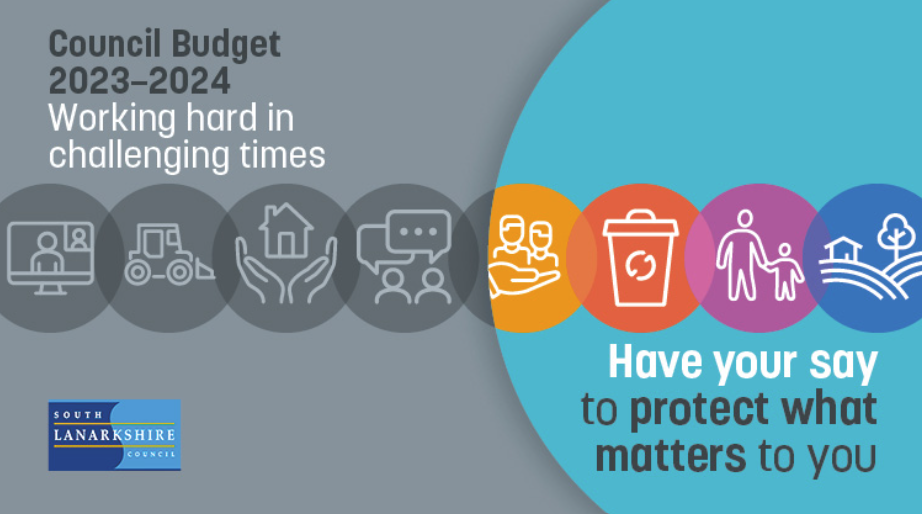South Lanarkshire Council (SLC) are consulting on their budget for 2023/24 and there is the prospect of significant cuts to some vital Council services. We are providing a link to the budget consultation here (which has a deadline of 8 February 2023) and further information below on the budget, where the cuts might fall, how the Council might get additional revenue, and the big picture of the Scottish Government budget.
Budget consultation
This is what SLC say:
“at a time when local residents depend on our services more than ever….. our real-term funding has reduced substantially in recent years – we have had to find savings of more than £150 million over the last decade. In addition, like all parts of society, the council currently faces huge increases in costs, especially due to inflationary rises.
“At this stage, the difference between what we need to deliver the services local people rely on and the amount of money we expect to have available to fund them is £16.3m. This gap was initially £37.5m but was reduced through finding efficiencies across the council, but some tough choices still will have to be made.
“Every year during the budget process we ask our residents for their views, so we can share them with the councillors who will make the final decisions. Given the difficult financial position, we need your input more than ever.
“The following short survey should take only a few minutes to complete, but it will allow you to have your voice heard – to help protect the services that mean the most to you and tell us what you think are acceptable charges we can make to ensure we can keep delivering them.”
The link to the budget consultation is here.
How much does the Council spend?
In 2022/23, South Lanarkshire Council had a budget of £857 million over half of which was spent on education, and the remainder on roads, transport subsidies, social work, housing, leisure, cleansing, libraries etc and planning. Just under half of the budget came from non-domestic rates (£423mill), a further £236mill from government grants and the remainder from Council Tax. Band D Council Tax was sat at £1233 – the Scottish average is £1308.
What cuts might be involved?
The most recent Update on the Budget Strategy 2023-2024 we have seen (18 January) sets out a range of options for reducing Council spending to cover the stated gap of £16.3 mill. These include changes to planning fees, free school meals, food bin liners, Christmas trees and lights switch on, parking, bulk and garden waste uplifts, summer children funding, teacher numbers, pupil equity fund (school attainment) support, access to period products, children counselling services, early learning and childcare, second homes relief, and funding for the Health and Care partnership.
More money from Council Tax?
The SLC budget strategy update states that “no account has been taken of any increase in Council Tax. Each 1% increase in Band D would generate successive amounts of £1.452 million.”
So, a 1% increase in Band D Council Tax, would cost householders an additional £12.33 a year, generating an additional c.£1.5 million. A 2% increase would cost an additional £24.66 a year, generating an additional £2.9 million, and so on.
Council Leader letter to MSPs
We have been sent a letter from South Lanarkshire Council Leader, Cllr Joe Fagan, which has been addressed to MSPs stating: “I am writing to all South Lanarkshire Members of the Scottish Parliament to appeal to your conscience, to insist that you to reject real-terms cuts to our Council’s core budget and to help us secure a radically improved funding settlement for our area.”
The Big Picture: Scottish Government Budget and Local Government
The Scottish Budget 2023-24 announced by the Scottish Government sets out the different components of local government funding (Chapter 5). The Scottish Parliament Information Centre (SPICe) have done an analysis of the budget. Their assessment of the claims on the impact of the budget on local government is:
“Local government spend is always a contested area and this year is no different. The Budget shows the total local government allocation for 2023-24 increasing by £637 million in cash terms, or £223 million in “real” terms, when compared to Budget 2022-23.COSLA argues that the actual cash increase announced by the Deputy First Minister will be much smaller once existing policy commitments are taken into account. COSLA’s news release focuses on “core” budget, which is the combination of general and specific revenue grants and income from non-domestic rates. This core revenue budget sees a real terms reduction of 0.2% between Budget 2022-23 and Budget 2023-24.”
